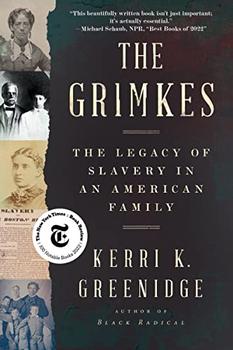Summary | Excerpt | Reviews | Beyond the Book | Readalikes | Genres & Themes | Author Bio

The Legacy of Slavery in an American Family
by Kerri K. Greenidge
With the Grimke sisters as symbols of white women's politics within antebellum reform movements, scholars have cast Francis and Archibald Grimke as footnotes in the supposedly more significant story of righteous white women redeemed from their slaveholding birthright through their conversion to radical abolition. In the most recent incarnation of this story, Mark Perry's Lift Up Thy Voice: The Sarah and Angelina Grimke Family's Journey from Slaveholders to Civil Rights Leaders (2002), Nancy Weston—the enslaved woman who gave birth to Archie, Frank, and their third brother, John—is described along with her sons as merely one aspect of the "essentially American" story of the white Grimke sisters. Although Perry describes the Grimke brothers' escape from South Carolina enslavement to middle-class respectability in Boston and Washington, he provides little analysis of the white Grimke sisters' benevolent racism alongside their financial and personal generosity. 21 What did it mean that John Grimke retreated to self-imposed exile from his family and was variously described as "embittered" and "estranged"? Why were Archie and Frank singled out for education, and what emotional toll did the Grimke sisters' insistence on racial excellence impose on their Black nephews?
In the popular imagination, the Grimke sisters' story has become known through one best-selling novel as well as an acclaimed PBS documentary. In both, the lives of Archie, Frank, and John have been reduced to feel-good stories of racial triumph over adversity, their public achievements rarely interrogated for the racial trauma from which these achievements emerged. Angelina and Sarah Grimke might have embraced their Black nephews; they might have supported their education and welcomed Archie into their social circle. But they also tolerated the sadistic abuse their brother Henry Grimke inflicted on the enslaved, even as this abuse produced the Black nephews for whom they later claimed to selflessly provide. The stories that families tell themselves about the racial trauma in their past is a theme throughout this book. The Grimkes reveals the intergenerational legacy of white reformers' disavowal of their complicity in America's racial project. Their Black descendants rarely enjoyed the privilege of ignoring history, even if the details of this history were largely unknown.
As it turned out, the details of the Black Grimkes that were known, although not unique in America's long history of enslavement, were far more devastating than either the white Grimke sisters or their Black nephews ever publicly admitted. Henry F. Grimke was a notoriously violent and sadistic slaveholder who wielded his power as an immensely wealthy white man just as completely as any of the Charleston elite to which he and his famous family belonged. Nancy Weston was herself the descendant of enslaved Black women who were sexually exploited by the white men who claimed them and their families. Her family and kin—those in Black Charleston, most of them "free people of color" with personal ties to the so-called Black Westons beyond direct blood line or parentage—ensured that the Grimke brothers survived through a vast network of Black mutual aid led mostly by women. 22 Even as they made possible the Grimke brothers' survival, however, the "colored Westons" (as Nancy called them) perpetuated the notion that skin color, free status, and ties to elite kin were enough to shield their children against the violent slave system that shaped their lives. With emancipation, and with the expansion of the colored elite that followed the Civil War, this faith in the superficialities of skin color, free status, and family name laid the foundation for "representative colored men and women" who used their relative social and economic advantages to police themselves, their families, and their communities in a vain attempt to uplift the race to a level at which the forces of Jim Crow, disenfranchisement, and lynching would cease. The Grimkes is also the story of the superficialities of the colored elite, from its antebellum roots through the early twentieth century, and how these superficialities, specifically skin color, racial respectability, and class—the triple legacies of enslavement and "caste prejudice" (as racism was called at the time)—haunted Black communities as they navigated the virulent racial injustices that followed Reconstruction's collapse.
Reprinted from The Grimkes: The Legacy of Slavery in an American Family by Kerri K. Greenidge. Copyright © 2022 by Kerri K. Greenidge. Used with permission of the publisher, Liveright Publishing Corporation, a division of W. W. Norton & Company, Inc. All rights reserved.




Second hand books are wild books...
Click Here to find out who said this, as well as discovering other famous literary quotes!
Your guide toexceptional books
BookBrowse seeks out and recommends the best in contemporary fiction and nonfiction—books that not only engage and entertain but also deepen our understanding of ourselves and the world around us.